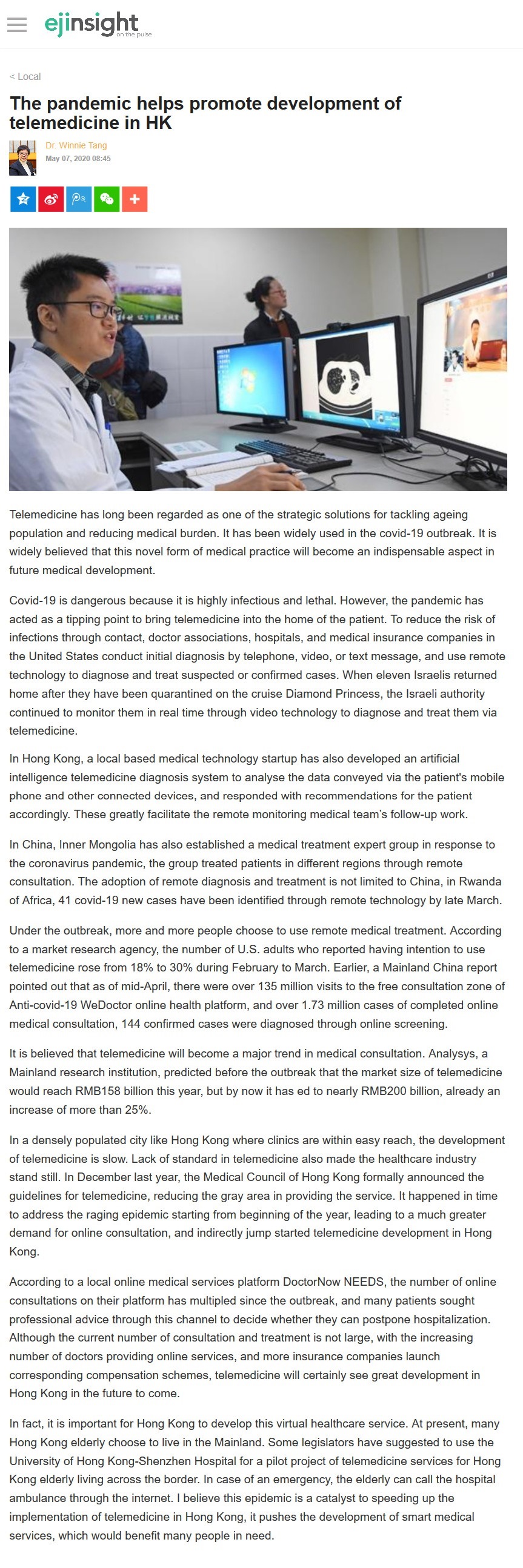網上版請按此

The pandemic helps promote development of telemedicine in HK
Telemedicine has long been regarded as one of the strategic solutions for tackling ageing population and reducing medical burden. It has been widely used in the covid-19 outbreak. It is widely believed that this novel form of medical practice will become an indispensable aspect in future medical development.
Covid-19 is dangerous because it is highly infectious and lethal. However, the pandemic has acted as a tipping point to bring telemedicine into the home of the patient. To reduce the risk of infections through contact, doctor associations, hospitals, and medical insurance companies in the United States conduct initial diagnosis by telephone, video, or text message, and use remote technology to diagnose and treat suspected or confirmed cases. When eleven Israelis returned home after they have been quarantined on the cruise Diamond Princess, the Israeli authority continued to monitor them in real time through video technology to diagnose and treat them via telemedicine.
In Hong Kong, a local based medical technology startup has also developed an artificial intelligence telemedicine diagnosis system to analyse the data conveyed via the patient's mobile phone and other connected devices, and responded with recommendations for the patient accordingly. These greatly facilitate the remote monitoring medical team's follow-up work.
In China, Inner Mongolia has also established a medical treatment expert group in response to the coronavirus pandemic, the group treated patients in different regions through remote consultation. The adoption of remote diagnosis and treatment is not limited to China, in Rwanda of Africa, 41 covid-19 new cases have been identified through remote technology by late March.
Under the outbreak, more and more people choose to use remote medical treatment. According to a market research agency, the number of U.S. adults who reported having intention to use telemedicine rose from 18% to 30% during February to March. Earlier, a Mainland China report pointed out that as of mid-April, there were over 135 million visits to the free consultation zone of Anti-covid-19 WeDoctor online health platform, and over 1.73 million cases of completed online medical consultation, 144 confirmed cases were diagnosed through online screening.
It is believed that telemedicine will become a major trend in medical consultation. Analysys, a Mainland research institution, predicted before the outbreak that the market size of telemedicine would reach RMB158 billion this year, but by now it has ed to nearly RMB200 billion, already an increase of more than 25%.
In a densely populated city like Hong Kong where clinics are within easy reach, the development of telemedicine is slow. Lack of standard in telemedicine also made the healthcare industry stand still. In December last year, the Medical Council of Hong Kong formally announced the guidelines for telemedicine, reducing the gray area in providing the service. It happened in time to address the raging epidemic starting from beginning of the year, leading to a much greater demand for online consultation, and indirectly jump started telemedicine development in Hong Kong.
According to a local online medical services platform DoctorNow NEEDS, the number of online consultations on their platform has multipled since the outbreak, and many patients sought professional advice through this channel to decide whether they can postpone hospitalization. Although the current number of consultation and treatment is not large, with the increasing number of doctors providing online services, and more insurance companies launch corresponding compensation schemes, telemedicine will certainly see great development in Hong Kong in the future to come.
In fact, it is important for Hong Kong to develop this virtual healthcare service. At present, many Hong Kong elderly choose to live in the Mainland. Some legislators have suggested to use the University of Hong Kong-Shenzhen Hospital for a pilot project of telemedicine services for Hong Kong elderly living across the border. In case of an emergency, the elderly can call the hospital ambulance through the internet. I believe this epidemic is a catalyst to speeding up the implementation of telemedicine in Hong Kong, it pushes the development of smart medical services, which would benefit many people in need.
Dr. Winnie Tang
Adjunct Professor, Department of Computer Science, Faculty of Engineering and Faculty of Architecture, The University of Hong Kong